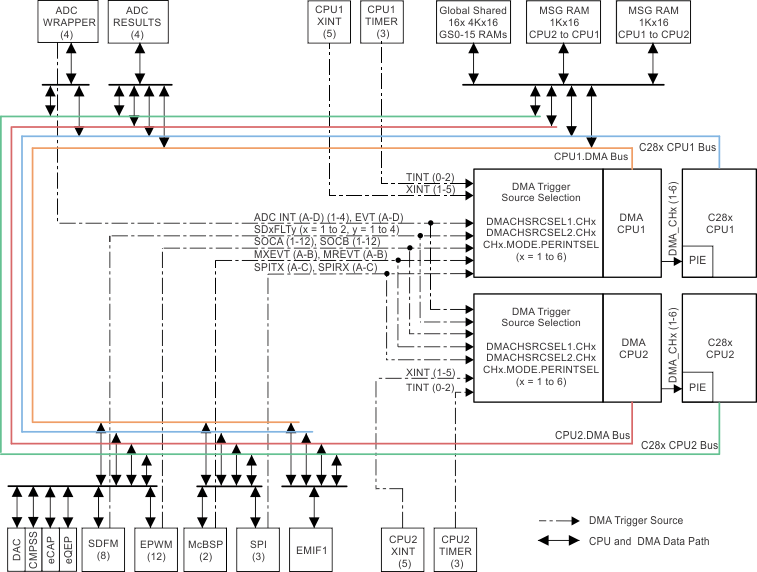JAJSEG7 December 2017 TMS320F28377D-EP
PRODUCTION DATA.
- 1デバイスの概要
- 2改訂履歴
- 3Terminal Configuration and Functions
-
4Specifications
- 4.1 Absolute Maximum Ratings
- 4.2 ESD Ratings
- 4.3 Recommended Operating Conditions
- 4.4 Power Consumption Summary
- 4.5 Electrical Characteristics
- 4.6 Thermal Resistance Characteristics
- 4.7
System
- 4.7.1 Power Sequencing
- 4.7.2 Reset Timing
- 4.7.3
Clock Specifications
- 4.7.3.1 Clock Sources
- 4.7.3.2 Clock Frequencies, Requirements, and Characteristics
- 4.7.3.3 Input Clocks and PLLs
- 4.7.3.4 Crystal Oscillator
- 4.7.3.5 Internal Oscillators
- 4.7.4 Flash Parameters
- 4.7.5 Emulation/JTAG
- 4.7.6 GPIO Electrical Data and Timing
- 4.7.7 Interrupts
- 4.7.8
Low-Power Modes
- 4.7.8.1 Clock-Gating Low-Power Modes
- 4.7.8.2 Power-Gating Low-Power Modes
- 4.7.8.3
Low-Power Mode Wakeup Timing
- Table 4-29 IDLE Mode Timing Requirements
- Table 4-30 IDLE Mode Switching Characteristics
- Table 4-31 STANDBY Mode Timing Requirements
- Table 4-32 STANDBY Mode Switching Characteristics
- Table 4-33 HALT Mode Timing Requirements
- Table 4-34 HALT Mode Switching Characteristics
- Table 4-35 HIBERNATE Mode Timing Requirements
- Table 4-36 HIBERNATE Mode Switching Characteristics
- 4.7.9 External Memory Interface (EMIF)
- 4.8
Analog Peripherals
- 4.8.1
Analog-to-Digital Converter (ADC)
- 4.8.1.1
ADC Electrical Data and Timing
- Table 4-41 ADC Operating Conditions (16-Bit Differential Mode)
- Table 4-42 ADC Characteristics (16-Bit Differential Mode)
- Table 4-43 ADC Operating Conditions (12-Bit Single-Ended Mode)
- Table 4-44 ADC Characteristics (12-Bit Single-Ended Mode)
- Table 4-45 ADCEXTSOC Timing Requirements
- 4.8.1.1.1 ADC Input Models
- 4.8.1.1.2 ADC Timing Diagrams
- 4.8.1.2 Temperature Sensor Electrical Data and Timing
- 4.8.1.1
ADC Electrical Data and Timing
- 4.8.2 Comparator Subsystem (CMPSS)
- 4.8.3 Buffered Digital-to-Analog Converter (DAC)
- 4.8.1
Analog-to-Digital Converter (ADC)
- 4.9
Control Peripherals
- 4.9.1 Enhanced Capture (eCAP)
- 4.9.2 Enhanced Pulse Width Modulator (ePWM)
- 4.9.3 Enhanced Quadrature Encoder Pulse (eQEP)
- 4.9.4 High-Resolution Pulse Width Modulator (HRPWM)
- 4.9.5 Sigma-Delta Filter Module (SDFM)
- 4.10
Communications Peripherals
- 4.10.1 Controller Area Network (CAN)
- 4.10.2 Inter-Integrated Circuit (I2C)
- 4.10.3
Multichannel Buffered Serial Port (McBSP)
- 4.10.3.1
McBSP Electrical Data and Timing
- 4.10.3.1.1 McBSP Transmit and Receive Timing
- 4.10.3.1.2
McBSP as SPI Master or Slave Timing
- Table 4-69 McBSP as SPI Master or Slave Timing Requirements (CLKSTP = 10b, CLKXP = 0)
- Table 4-70 McBSP as SPI Master or Slave Switching Characteristics (CLKSTP = 10b, CLKXP = 0)
- Table 4-71 McBSP as SPI Master or Slave Timing Requirements (CLKSTP = 11b, CLKXP = 0)
- Table 4-72 McBSP as SPI Master or Slave Switching Characteristics (CLKSTP = 11b, CLKXP = 0)
- Table 4-73 McBSP as SPI Master or Slave Timing Requirements (CLKSTP = 10b, CLKXP = 1)
- Table 4-74 McBSP as SPI Master or Slave Switching Characteristics (CLKSTP = 10b, CLKXP = 1)
- Table 4-75 McBSP as SPI Master or Slave Timing Requirements (CLKSTP = 11b, CLKXP = 1)
- Table 4-76 McBSP as SPI Master or Slave Switching Characteristics (CLKSTP = 11b, CLKXP = 1)
- 4.10.3.1
McBSP Electrical Data and Timing
- 4.10.4 Serial Communications Interface (SCI)
- 4.10.5 Serial Peripheral Interface (SPI)
- 4.10.6 Universal Serial Bus (USB) Controller
- 4.10.7 Universal Parallel Port (uPP) Interface
-
5Detailed Description
- 5.1 Overview
- 5.2 Functional Block Diagram
- 5.3 Memory
- 5.4 Identification
- 5.5 Bus Architecture – Peripheral Connectivity
- 5.6 C28x Processor
- 5.7 Control Law Accelerator
- 5.8 Direct Memory Access
- 5.9 Interprocessor Communication Module
- 5.10 Boot ROM and Peripheral Booting
- 5.11 Dual Code Security Module
- 5.12 Timers
- 5.13 Nonmaskable Interrupt With Watchdog Timer (NMIWD)
- 5.14 Watchdog
- 5.15 Configurable Logic Block (CLB)
- 6Applications, Implementation, and Layout
- 7デバイスおよびドキュメントのサポート
- 8メカニカル、パッケージ、および注文情報
パッケージ・オプション
メカニカル・データ(パッケージ|ピン)
サーマルパッド・メカニカル・データ
- PTP|176
発注情報
5.8 Direct Memory Access
Each CPU has its own 6-channel DMA module. The DMA module provides a hardware method of transferring data between peripherals and/or memory without intervention from the CPU, thereby freeing up bandwidth for other system functions. Additionally, the DMA has the capability to orthogonally rearrange the data as it is transferred as well as “ping-pong” data between buffers. These features are useful for structuring data into blocks for optimal CPU processing.
The DMA module is an event-based machine, meaning it requires a peripheral or software trigger to start a DMA transfer. Although it can be made into a periodic time-driven machine by configuring a timer as the interrupt trigger source, there is no mechanism within the module itself to start memory transfers periodically. The interrupt trigger source for each of the six DMA channels can be configured separately and each channel contains its own independent PIE interrupt to let the CPU know when a DMA transfer has either started or completed. Five of the six channels are exactly the same, while Channel 1 has the ability to be configured at a higher priority than the others.
DMA features include:
- Six channels with independent PIE interrupts
- Peripheral interrupt trigger sources
- ADC interrupts and EVT signals
- Multichannel buffered serial port transmit and receive
- External interrupts
- CPU timers
- EPWMxSOC signals
- SPIx transmit and receive
- SDFM
- Software trigger
- Data sources and destinations:
- GSx RAM
- CPU message RAM (IPC RAM)
- ADC result registers
- ePWMx
- SPI
- McBSP
- EMIF
- Word Size: 16-bit or 32-bit (SPI and McBSP limited to 16-bit)
- Throughput: four cycles/word (without arbitration)
Figure 5-3 shows a device-level block diagram of the DMA.
 Figure 5-3 DMA Block Diagram
Figure 5-3 DMA Block Diagram